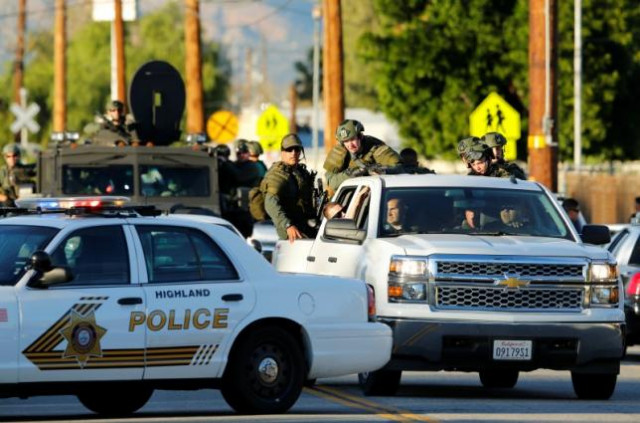Families of San Bernardino shooting sue Facebook, Google, Twitter
Relatives assert three companies provided "material support" to Islamic State and enabled the attacks

Syed Rizwan Farook and his wife, Tashfeen Malik, opened fire on a holiday gathering of Farook's co-workers at a government building in San Bernardino on December 2, 2015, killing 14 people and wounding 22 others. PHOTO: REUTERS
The relatives assert that by allowing Islamic State militants to spread propaganda freely on social media, the three companies provided "material support" to the group and enabled attacks such as the one in San Bernardino.
"For years defendants have knowingly and recklessly provided the terrorist group ISIS with accounts to use its social networks as a tool for spreading extremist propaganda, raising funds and attracting new recruits," family members of Sierra Clayborn, Tin Nguyen and Nicholas Thalasinos charge in the 32-page complaint, which was filed in US District Court in Los Angeles on Wednesday.
Trump accuses media of ignoring terrorist attacks
"Without defendants Twitter, Facebook and Google (YouTube), the explosive growth of ISIS over the last few years into the most feared terrorist group in the world would not have been possible," the complaint said.
Spokesperson for Twitter and Google declined to comment on the lawsuit. Representatives for Facebook could not immediately be reached by Reuters on Thursday afternoon.
Syed Rizwan Farook and his wife, Tashfeen Malik, opened fire on a holiday gathering of Farook's co-workers at a government building in San Bernardino on December 2, 2015, killing 14 people and wounding 22 others.
Farook, the 28-year-old, US-born son of Pakistani immigrants, and Malik, 29, a Pakistani native, died in a shootout with police four hours after the massacre.
Hacker released tools FBI used to crack San Bernardino attacker’s iPhone online
Authorities have said the couple was inspired by militants. At the time, the assault ranked as the deadliest attack by religious extremists on US soil since the September 11, 2001, attacks. In June 2016, an American-born gunman pledging allegiance to the leader of Islamic State shot 49 people to death at the Pulse nightclub in Orlando, Florida, before he was killed by police.
In December 2016 the families of three men killed at the nightclub sued Twitter, Google and Facebook in federal court on allegations similar to those in the California lawsuit.
Federal law gives internet companies broad immunity from liability for content posted by their users. A number of lawsuits have been filed in recent years seeking to hold social media companies responsible for terror attacks, but none has advanced beyond the preliminary phases.



















COMMENTS
Comments are moderated and generally will be posted if they are on-topic and not abusive.
For more information, please see our Comments FAQ